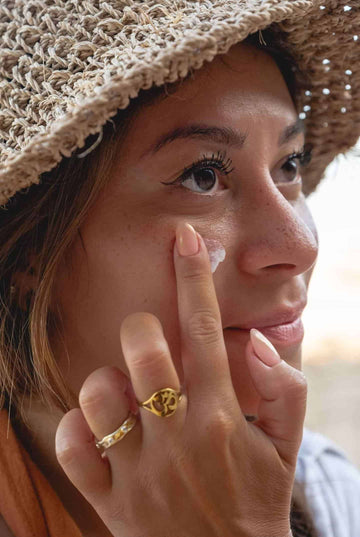
YOUR SKIN
SKIN • VEST • MENT
The Importance of Skin Health
The skin is the largest organ of our body. The skin is made up of three main layers: the epidermis, dermis and subcutis. Our skin is a good indicator of our general health and plays a vital role in protecting us from external factors such as the sun’s harmful rays, pollution, and bacteria.
Sun exposure can have a significant impact on our skin health. While the sun provides us with essential Vitamin D, too much exposure to UV rays can lead to premature aging, skin damage, and even skin cancer. That’s why it’s important to take steps to protect our skin from harmful UV rays.
By applying sunscreen regularly, we can significantly reduce the risk of sunburn and other forms of skin damage.
In addition to using sunscreen, there are other steps we can take to protect our skin from sun damage. Wearing protective clothing such as hats and long-sleeved shirts can help to block out harmful UV rays. And avoiding direct sunlight during peak hours (typically between 10 am and 2 pm) can also help to reduce the risk of sun damage.
Take action today and start taking steps to protect your skin!
By following these simple steps, you can help to protect your skin and keep it looking and feeling its best. So take the time to care for your skin, and you’ll be rewarded with healthy, beautiful skin for years to come.

What About Sensitive & Mature Skin?
Sensitive Skin & Hyper-Allergic Skin
Sensitive and hyper-allergic skin needs extra gentle protection, as it can easily react negatively to certain chemical ingredients commonly found in sunscreens or after-sun products. Your best choice is 100% mineral-based sunscreens, like those formulated with Non-Nano Zinc Oxide and Non-Nano Titanium Dioxide, which are less likely to cause irritation compared to chemical-based sunscreens. It's also advisable to avoid fragrances, alcohol, and other potential irritants to minimize the risk of skin reactions.
Mature Skin
Mature skin loses elasticity and becomes thinner and more delicate over time, making it more susceptible to damage from UV exposure. Using a broad-spectrum mineral sunscreen with added antioxidants like Vitamin E (Tocopheryl Acetate) can help protect against free radical damage. While Vitamin C is also beneficial, it's important to note that it's usually not included in sunscreen formulations but rather in separate antioxidant serums.For post-sun care, products enriched with peptides can support skin barrier repair, while retinol (if tolerated) can help boost collagen production and minimize the appearance of fine lines and wrinkles. However, retinol is generally not recommended for sun-exposed skin and should be used as part of an evening skincare routine.

"Sun protection doesn’t need to be complicated — it needs to be consistent."

Good to Know
No matter if it’s raining, cloudy or sunny – UV rays have a damaging effect on your skin 365 days a year.
Regular check-ups with a dermatologist are crucial to catch any changes in the skin early on, even if you’re diligent about sun protection. After sun exposure, our skin needs a bit of extra love.
Use a hydrating lotion to replenish moisture, and apply a cooling gel with aloe vera or cucumber to soothe sunburn and inflammation and prevents sun related skin aging.
Taking care of your skin after being in the sun is just as important as protecting it from harmful UV rays.












